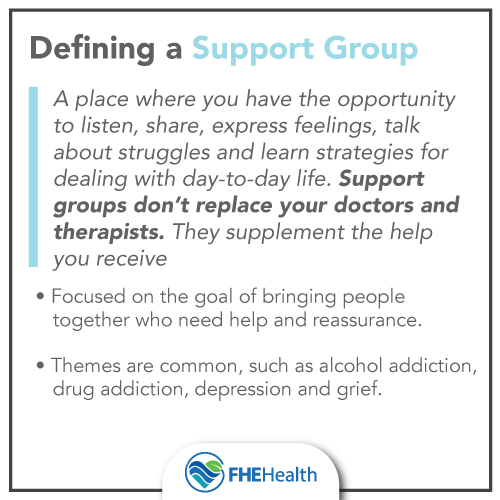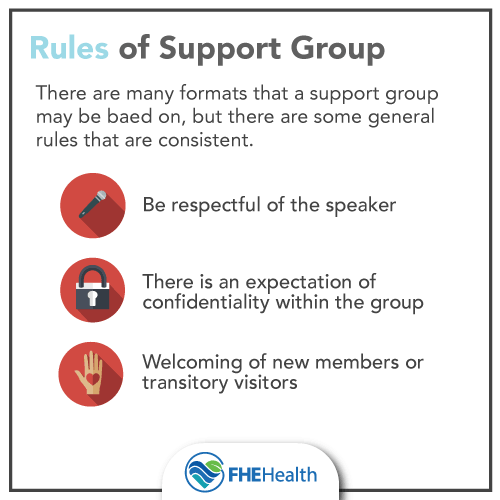
Having support through addiction is essential, but you need different kinds of support for different situations. Even if you have a family full of people willing to help, they aren’t necessarily what you need. However, support groups for family members of alcoholics can make things easier by connecting you with others who are going through similar experiences.
When you’re in the deep pit of addiction and need help to avoid using, you want someone who understands because they’ve been there. They know how to get you out of where you are. This is why support groups are vital.
What Are Support Groups?

A study published by the U.S. National Library of Medicine made it clear that the use of support groups improves the quality of life of those suffering from chronic disease.
The goal of support groups is to bring people together who need help and reassurance. Those in attendance are going through similar experiences and can offer a unique perspective that a therapist doesn’t have, family lacks and even friends can’t see.
Support groups for those with alcohol and drug addiction tend to revolve around dealing with crisis situations or triggers that could put you at risk of relapsing. But you can also use them to share successes and triumphant moments when you want to tell someone who truly understands.
In support groups, you have the opportunity to listen, share, express feelings, talk about struggles and learn strategies for dealing with day-to-day life. Support groups don’t replace your doctors and therapists. They supplement the help you receive and, in many cases, provide an outlet for your emotional and physical well-being.
Types of Support Groups
Support groups exist for many needs and follow various formats or treatment methods. Some focus on the individual, whether they’re struggling with a mental illness or addiction, while others are support groups for families of addicts.
Depression Support Groups
If you’re being treated for depression, having a support group can help you get firsthand knowledge and encouragement from those who are also battling this condition. You can talk openly about how you feel and discuss the strategies you use to overcome challenges. If you’re feeling scared or overwhelmed by the day’s events, a support group may give you the knowledge you need to reassure yourself.
Anxiety Support Group
An anxiety support group can be an excellent opportunity for you to stretch yourself further. When you attend a meeting, you’re in a room full of others feeling the same way you do. There’s no pressure and no expectations.
In this type of group, getting encouragement is key, but sharing strategies about how to manage situations or navigate high-anxiety challenges can give you the footing you need.
Alcohol Support Group
Perhaps the most well-known form of support groups, alcohol-related groups focus on both the good and bad. If you feel like having a drink, this is where you want and need to be.
When the day is truly difficult, this is where you can go for resources and potential understanding of your situation. There’s no judgment here. Additionally, people struggling to cope with an alcoholic in their family can attend support groups for family members of alcoholics.
If you’re struggling with alcoholism, you’re not alone. According to the National Survey on Drug Use and Health, 10.2% of people aged 12 and older have an alcohol use disorder.
Drug Addiction Support Group
One of the most powerful forms of support, drug addiction support groups provide the immediate, supportive environment you need if you’re thinking about using. Because those who have drug addictions tend to carry a significant amount of self-blame, this environment can provide immediate help from others who know how withdrawal feels and how challenging it is to live clean.
Support Groups for Addicts
Free support groups are held throughout the country for anyone trying to achieve sobriety, whether it’s from alcohol or other drugs. The following groups may help you or someone you know who’s pursuing sobriety:
Alcoholics Anonymous
AA is one of the largest groups for those working the 12-step program. The organization has a global presence and is often one of the first places people struggling with alcoholism go to seek help. You can find more information about the support group by finding a meeting near you.
Self-Management and Recovery Training
Smart Recovery provides self-help addiction recovery tools and resources in local communities and online. This volunteer-driven nonprofit goes beyond virtual and in-person meetings and offers a wide variety of podcasts and videos to help anyone achieve sobriety. You can learn more about SMART Recovery and locate a meeting in your area online.
LifeRing Secular Recovery
LifeRing Secular Recovery offers meetings in person and online for a constant level of support. This is an abstinence-based program, but it’s not a 12-step program. LifeRing offers virtual and in-person meetings.
Recovering Couples Anonymous
RCA caters to couples who’ve struggled to maintain positive values in their relationship due to drug and alcohol addictions as well as dysfunctional behavior in general. The only requirement for couples to join RCA is a commitment to maintaining monogamy and increasing intimacy within their relationship. The RCA website has more information about meetings and the organization’s values.
What Standards Do Support Groups Follow?

When choosing any type of alcohol, drug or mental health support group, a key factor to consider is the standards they follow. For example, some organizations are very religious, while others offer peer support. Some common standards include the aforementioned Alcoholics Anonymous, SMART and LifeRing.
When choosing, aim for an organization or standard you believe in. If possible, choose one that follows the same basic model of care you’re receiving through a licensed therapist.
Support Groups Have Limitations
Support groups are incredible opportunities for those in need, but they can’t provide you with all the care you need if you’re battling addiction or mental health challenges. They can offer immediate help in a situation where you’re considering making the wrong decision. However, they can’t:
- Help you detox
- Support your immediate crisis, especially in situations of potential drug overdose or suicide risk
- Provide you with a comprehensive plan for long-term recovery
Support groups can provide you with insight, real-life support and guidance. All you have to do is reach out.
Support Groups for Family Members of Alcoholics
Most communities have numerous free support groups. A good place to start looking is through your current doctor or therapist. They may have a list of nearby facilities and organizations supporting these groups.
While many support groups focus on assisting those who are struggling with addiction, there are also several groups catering to the family members of addicts. Here are a few additional resources to help you or your loved ones find the necessary care.
Al-Anon
Al-Anon holds meetings around the world for friends and family of alcoholics. People share experiences about how their loved ones’ alcoholism affected their lives and how they’re making positive changes to improve their individual situation. Anyone concerned about the drinking habits of people in their lives can find an Al-Anon meeting in their area.
Alateen
Organized by the same group as Al-Anon, Alateen focuses on helping teenagers whose lives have been affected by other people’s struggles with alcoholism. In addition to their in-person meetings, Alateen has an online chat where teens can share their experiences and offer support for others. Teens can access informative literature and learn more about Alateen meetings on their website.
Families Anonymous
Similar to AA, FA utilizes a 12-step program to help those affected by alcoholics in their families. In addition to its meetings, the group can connect family members of addicts to a variety of affordable literature that may help in their journey. FA isn’t associated with other support groups. Learn more about FA and where to find a meeting on its website.
Parents of Addicted Loved Ones
PAL focuses on helping parents with a child who’s struggling to overcome addiction. It offers helpful resources catering to parents and grandparents. PAL holds meetings across the country.
Learn to Cope
Learn to Cope is a peer-led support group that assists families and friends of people who are overcoming addiction. In its meetings, people with loved ones who are in addiction or going through recovery share their experiences as well as advice on navigating the emotions they go through on their journey. Learn to Cope only holds in-person meetings in Massachusetts, but anyone can attend its virtual meetings.
Ready to Make a Change? Start With FHE Health
Your life depends on creating new opportunities with a comprehensive care plan designed just for your substance abuse or mental health needs. FHE Health offers private, customized treatment plans. To learn more about how we can help you, contact one of our compassionate counselors 24-7.






